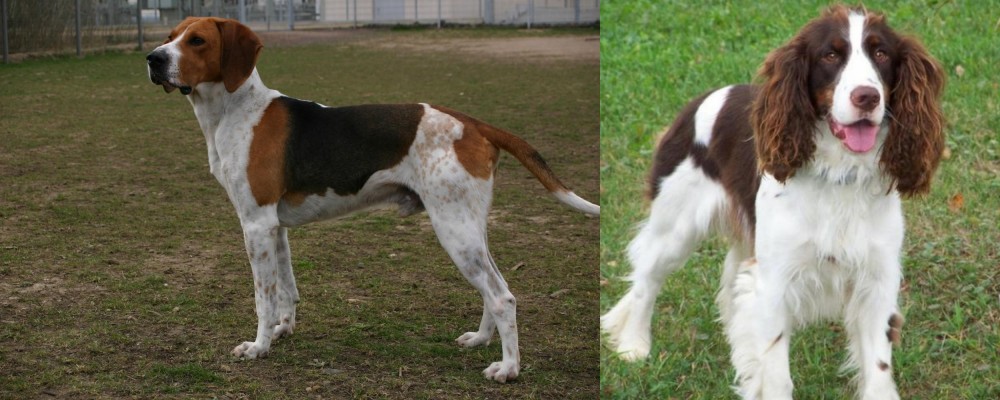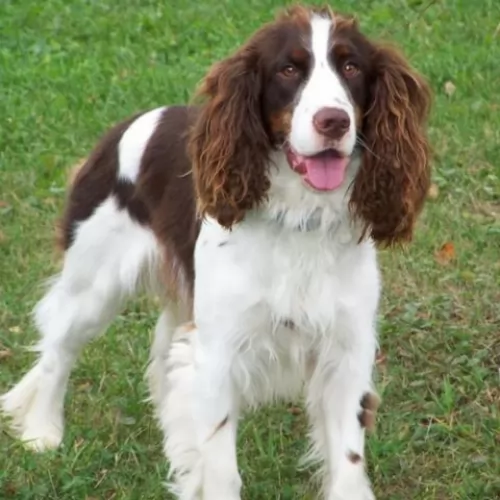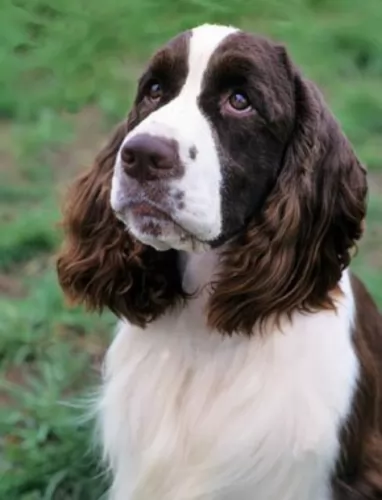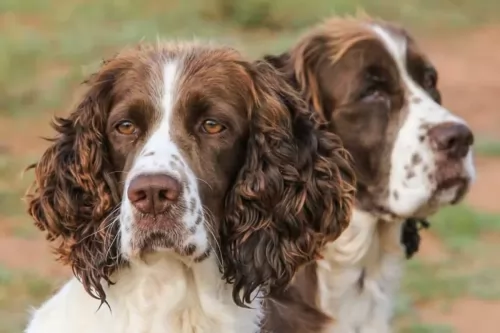 Petzlover
Petzlover Anglo-Francais de Petite Venerie is originated from France but English Springer Spaniel is originated from United Kingdom. Anglo-Francais de Petite Venerie may grow 20 cm / 8 inches higher than English Springer Spaniel. Both Anglo-Francais de Petite Venerie and English Springer Spaniel are having almost same weight. Both Anglo-Francais de Petite Venerie and English Springer Spaniel has almost same life span. Both Anglo-Francais de Petite Venerie and English Springer Spaniel has almost same litter size. Both Anglo-Francais de Petite Venerie and English Springer Spaniel requires Low Maintenance.
Anglo-Francais de Petite Venerie is originated from France but English Springer Spaniel is originated from United Kingdom. Anglo-Francais de Petite Venerie may grow 20 cm / 8 inches higher than English Springer Spaniel. Both Anglo-Francais de Petite Venerie and English Springer Spaniel are having almost same weight. Both Anglo-Francais de Petite Venerie and English Springer Spaniel has almost same life span. Both Anglo-Francais de Petite Venerie and English Springer Spaniel has almost same litter size. Both Anglo-Francais de Petite Venerie and English Springer Spaniel requires Low Maintenance.
 The Anglo-Francais de Petite Venerie is one of the oldest scent hunting dogs around. A crossbreed between the French Hounds and the English hunting dogs, the Anglo-Francais de Petite Venerie is believed to be an offspring of several famous dogs such as the Beagles, the Poitevins, and the Petit Gascon-Sainttongeois.
The Anglo-Francais de Petite Venerie is one of the oldest scent hunting dogs around. A crossbreed between the French Hounds and the English hunting dogs, the Anglo-Francais de Petite Venerie is believed to be an offspring of several famous dogs such as the Beagles, the Poitevins, and the Petit Gascon-Sainttongeois.
Although the genesis of this dog breed is somewhat unclear, a majority of the sources believe that it was developed in the 16th century at a time when written records of dog breeding never existed. Throughout the 16th to the 17th centuries, the Anglo-Francais de Petite Venerie became a treasured dog breed thanks to the rise of hunting games among European nobles. As the sport thrived in England and especially in France, the need to own the Anglo-Francais de Petite Venerie became paramount leading to this dog breed’s popularity. Formerly known as the Petit Anglo-Francais, this dog breed was changed to its current name in 1978 before being admitted to the United Kennel Club in 1996.
 The English Springer Spaniel is one of many gun dog breeds that flush and retrieve. They descended from the Shropshire Spaniels and Norfolk Spaniels. The English Springer Spaniel is somewhat similar to the Welsh Springer Spaniel and believe it or not they are also closely related to the English Cocker Spaniel. In the last century the cockers and springers came from the same parents. The larger dogs flushed game and made game “spring” from the brush while the smaller dogs – the “cockers” would hunt woodcock. Eventually through specific breeding, the UKC of England recognized the “springers” as a separate breed.
The English Springer Spaniel is one of many gun dog breeds that flush and retrieve. They descended from the Shropshire Spaniels and Norfolk Spaniels. The English Springer Spaniel is somewhat similar to the Welsh Springer Spaniel and believe it or not they are also closely related to the English Cocker Spaniel. In the last century the cockers and springers came from the same parents. The larger dogs flushed game and made game “spring” from the brush while the smaller dogs – the “cockers” would hunt woodcock. Eventually through specific breeding, the UKC of England recognized the “springers” as a separate breed.
Sydenham Edwards, in 1801, proposed that the spaniels be divided into the Springing or Hawking Spaniel and the Cocking or Cocker Spaniel. From this point on there was a flourish in the development of spaniel breeds in the 19th century. They were usually named for the county in which they were founded or after the individual who developed them. In 1902, the English Springer Spaniel was officially recognized as its own breed by the UKC. It was not until 1910 that the AKC recognized them as well.
 The Anglo-Francais de Petite Venerie is a dog breed that resembles a Beagle. Developed in France, this scent hound has served as a hunting dog for centuries making it an athletic breed with unusual characteristics. Their chests are narrow and deep while the heads are smaller as compared to the rest of the body. The eyes are brown and dark while the tails are medium in size. The limbs are tall, straight, and muscular while their steady necks and broad muzzles are an indication that these dogs are surely bred for hunting purposes.
The Anglo-Francais de Petite Venerie is a dog breed that resembles a Beagle. Developed in France, this scent hound has served as a hunting dog for centuries making it an athletic breed with unusual characteristics. Their chests are narrow and deep while the heads are smaller as compared to the rest of the body. The eyes are brown and dark while the tails are medium in size. The limbs are tall, straight, and muscular while their steady necks and broad muzzles are an indication that these dogs are surely bred for hunting purposes.
Since Anglo-Francais de Petite Venerie are athletic dogs, you will, of course, expect their overall weight to be lesser as compared to most other breeds. These dogs have a short, dense coat that’s easy to groom. With a life expectancy of about 13 years, these breeds are generally healthy and quite easy to maintain. The only major problem these scent hounds experience is a hip and elbow dysplasia which will require you to inspect them for injuries upon returning home from their line of duty.
 Among spaniels the English Springer is medium size and well compacted. Both the working dog and the show dog sport moderately long coats and a friendly tail. They both wear a gentle expression in their eyes. But there the commonality stops as the difference between the working English Springer Spaniel and the show line is greater in this breed than in any other. The gene pools have become almost separate over the last 70 years. If you put a field dog in the show ring they would not be able to compete. If you put a show line English Springer in the field, they would not have the stamina or speed for field trials.
Among spaniels the English Springer is medium size and well compacted. Both the working dog and the show dog sport moderately long coats and a friendly tail. They both wear a gentle expression in their eyes. But there the commonality stops as the difference between the working English Springer Spaniel and the show line is greater in this breed than in any other. The gene pools have become almost separate over the last 70 years. If you put a field dog in the show ring they would not be able to compete. If you put a show line English Springer in the field, they would not have the stamina or speed for field trials.
The field line has a coarser coat and less pendulous ears. They may dock a few inches off the tail, and they are much scruffier than the show dogs. On the other hand, the show dogs have dewlaps, pendant ears and dangling flews. They are heavier and thicker than the field dog. They have long muzzles, not so prominent eyes and docked tails. The English Springer Spaniel stands tall and proud, coming from an ancient line of Spaniels
 Anglo-Francais de Petite Venerie are non-aggressive, stubborn but tolerable dogs that work well with kids. However, proper training and socialization must be conducted to ensure that these dogs don’t cause harm to your kids.
Anglo-Francais de Petite Venerie are non-aggressive, stubborn but tolerable dogs that work well with kids. However, proper training and socialization must be conducted to ensure that these dogs don’t cause harm to your kids.
The Anglo-Francais de Petite Venerie is not a shy pet. These dog breeds do make a perfect companion especially due to their hunting characteristics. They can get along well with new owners and should be kept with a same-breed companion to reduce nervousness.
When it comes to their adaptability, Anglo-Francais de Petite Venerie are better suited to be working dogs over being kept indoors. They are therefore suited to farm settings or rural areas where there’s vast track of lands to play and exercise.
Finally, the Anglo-Francais de Petite Venerie is not suited to everyone. This is because this dog breed is quite stubborn and unable to follow orders like most indoor pets do.
 The English Springer Spaniel is a friendly dog who loves to please his people. They are great family dogs, easy-going and affectionate. In addition, they are attentive and alert which makes them such great hunting dogs. With exceptional speed and stamina, he needs activity to stimulate his body and brain. He is very intelligent. That intelligence can lead to stubbornness as well. He’d great with kids and good with other pets with perhaps the exception of cats. The breed is in love with water and will get in at any time.
The English Springer Spaniel is a friendly dog who loves to please his people. They are great family dogs, easy-going and affectionate. In addition, they are attentive and alert which makes them such great hunting dogs. With exceptional speed and stamina, he needs activity to stimulate his body and brain. He is very intelligent. That intelligence can lead to stubbornness as well. He’d great with kids and good with other pets with perhaps the exception of cats. The breed is in love with water and will get in at any time.
 The Anglo-Francais de Petite Venerie is known to be a generally healthy dog with very few health concerns. We think the reason why it’s a healthy dog is due to its athletic characteristic and medium-sized body which is not prone to problems as compared to its large-sized contemporaries. However, since this scent hound is a cross-breed between two well-known breeds, there are chances that it might suffer from several health problems that mostly affect closely related breeds. Some of these health issues include;
The Anglo-Francais de Petite Venerie is known to be a generally healthy dog with very few health concerns. We think the reason why it’s a healthy dog is due to its athletic characteristic and medium-sized body which is not prone to problems as compared to its large-sized contemporaries. However, since this scent hound is a cross-breed between two well-known breeds, there are chances that it might suffer from several health problems that mostly affect closely related breeds. Some of these health issues include;
The hip and elbow dysplasia is a skeletal condition that occurs when the hip or elbow joints fail to develop properly. This condition is very painful and is most common in large breeds such as the St. Bernard, Great Dane, and the German Shepherd. Although the main causes of this condition include; poor nutrition, obesity, lack of exercise, and excessive growth, hereditary issues are very common and can’t be ruled out.
Another health condition you need to watch out for is the demodectic mange. An inflammatory disease caused by various types of mites, the mange can become intolerable in case the number of mites inhabiting your dog’s hair follicles become exorbitant. Among the common signs you’ll expect to see include; redness on the skin, alopecia, and problems with the immune system. To tackle this problem, pet owners will need to groom their dogs more often by digging deep into the skin to identify the mites.
Cataract is a normal eye condition that affects the eye lens causing it to lose its transparency resulting in impaired vision and later blindness. Although this condition is viewed as a byproduct of aging, some dog breeds such as the Anglo-Francais de Petite Venerie are most likely to suffer from this health condition. A common treatment for this condition may include; applying eye drops to help prevent inflammation, surgery or treatment of the underlying factor.
 Not an uncommon issue for most medium to smaller sized dogs. It can lead to lameness or arthritis.
Not an uncommon issue for most medium to smaller sized dogs. It can lead to lameness or arthritis.
Loss of vision due to a deterioration of the retina.
Clubs form in the retinal tissue and can lead to blindness.
The twisting or distention of the stomach that effects dogs with deep chests and can lead to death if not treated immediately.
 The Anglo-Francais de Petite Venerie puppies need to be fed with excellent-quality dog food to provide a balanced nutrition for precise growth. For puppies between 8 and 12 months, 4 bowls of food a day will be enough. Puppies ranging from 3 to 6 months old should be given at list 3 meals in 24 hours period. Always feed your puppies with top quality puppy foods to avoid any possible nutritional defects. Dry food mixed with canned food, broth, or water is perfect for puppies.
The Anglo-Francais de Petite Venerie puppies need to be fed with excellent-quality dog food to provide a balanced nutrition for precise growth. For puppies between 8 and 12 months, 4 bowls of food a day will be enough. Puppies ranging from 3 to 6 months old should be given at list 3 meals in 24 hours period. Always feed your puppies with top quality puppy foods to avoid any possible nutritional defects. Dry food mixed with canned food, broth, or water is perfect for puppies.
When your Anglo-Francais de Petite Venerie has reached maturity, it will be best that you feed him once in each day. Always go for the best dog food to ensure that you feed him with proper nutrition. Other meals you can incorporate (but in small quantities) are cooked eggs, fruits, veggies, and cottage cheese.
The Anglo-Francais de Petite Venerie should be fed with excellent-quality food to avoid various health problems such as tooth and bone concerns. Since these breeds are prone to hip dysplasia, regular veterinary check-ups should be observed at all times.
The Anglo-Francais de Petite Venerie is an athletic dog breed that requires regular physical activity to stay in good shape. Following the footsteps of their ancestors, these dogs are hunting dogs despite the fact that some people prefer keeping them indoors as pets. To eliminate boredom, it’s wise that you set aside some time on a daily basis to exercise your dog as well as take a walk down the streets or around the park.
 The English Springer Spaniel can gain weight easily and obesity is one of the biggest health issues for this breed. Feed them a high quality dry dog food. Working dogs need more energy and more calories than the inactive dog. An active member of the breed should have around 1353 calories every day in at least 2 meals if not 3. Do not feed a large meal before or after strenuous exercise as this can cause bloat.
The English Springer Spaniel can gain weight easily and obesity is one of the biggest health issues for this breed. Feed them a high quality dry dog food. Working dogs need more energy and more calories than the inactive dog. An active member of the breed should have around 1353 calories every day in at least 2 meals if not 3. Do not feed a large meal before or after strenuous exercise as this can cause bloat.
In addition to the health issues listed above the English Springer Spaniel is also prone to:
This is a genetic condition where the body cannot use the carbohydrates it takes in and convert it to energy. This is identified as a blood disorder.
Causes seizures but can be treated with medications.
With longer , droopy ears, infection is always a possibility. Clean them regularly and keep them dry.
The working English Springer Spaniel is a very energetic dog requiring daily exercise and loving to play. They love walks and hikes. They can excel in competitions such as rally, agility, tracking, field and obedience.